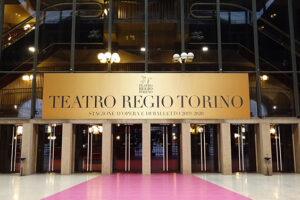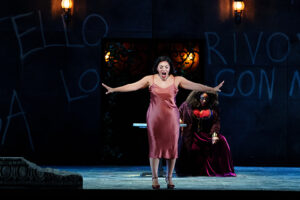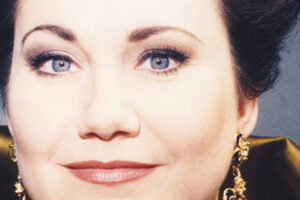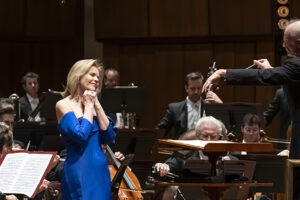

Bartoli was the first singer I encountered when I began studying “classical” voice in 2008. Like every young singer, including Pavarotti, I was given a copy of the book, 24 Italian Songs & Arias of the 17th and 18th Centuries, which is filled with delights like Gluck’s O del mio dolce ardor. Included with the book was a recital CD featuring all 24 songs performed by Bartoli. I was hooked.
Bartoli clearly made the most of her trips to Russia, collaborating with mega-maestro Valery Gergiev to track down these unheard gems at the Mariinsky Theatre, a collection that centres—as Gramophone puts it—“on a golden age for opera during the 18th century as three successive empresses (or tsaritsas) looked to Italy to bring the all-but-unknown form of opera to their courts at St Petersburg. Anna Ioannovna (Peter the Great’s niece, 1730–40), Elizaveta Petrovna (Elizabeth, 1741–62) and Catherine II (better known as Catherine the Great, 1762–96) looked west and south to draw on the culture of Europe, and they did it with style!”
With style, I am sure. But with the dynamism that Bartoli brings to this music? Hard to imagine. Nearly three decades after bursting on the scene in her early twenties, she remains a truly unprecedented and, likely, irreplaceable singer. Following on the heels of her Grammy-winning Sacrificium, Bartoli returns with an impeccably timed album, as the eyes of the world are turned to Russia and the brightest available minds try in vain to predict President Vladimir Putin’s next erratic move, let alone his broader strategic outlook.
Yet one would not be faulted for failing to see the Russian soul in these primarily Italian works. There are contemplative arias and daring cabalettas, but the overall impression is that these are not pieces that stand boldly on their own; a singer of Bartoli’s charisma and flexibility elevates them to edge-of-your-seat vocalism. Dall’Oglio’s “De’ miei flgli” from La Clémence de Titus is surprisingly plaintive and slow while Raupach’s “Idu na smert” from Altsesta—written 80 years before the first Russian opera—offers an opportunity to hear Bartoli sing in Russian for the first time (do you remember your first time?)
Bird-like noises permeated Araia’s “Pastor che a notte ombrosa” from Seleuco. In truth I forgot about much of the first half once Bartoli bulldozed her way through Raupach’s “O placido il mare” from Siroe, re di Persia. This was Cecilia Bartoli doing her thing, emitting some of the strangest and most captivating coloratura fireworks one could ever hope to hear. There were a cappella portions where the voice—inevitably a bit worn after decades of “extreme” singing—took to exaggerated subito piano. Why not, right?
Personally I found the second act more enjoyable as Bartoli brought Mozartean legato (that kind of thing always makes me sigh…) to “Non turbar que’ vaghi rai” from Manfredini’s Carlo Magno. This was somewhat of a flashback to Bartoli’s early years conquering Mozart roles all over the world, including at the Met. It is also a reminder of the choice words offered by Pavarotti’s former manager Herbert Breslin, who said of Bartoli, “There is not one major role she can sing… Big, big, big things don’t happen to little Despina!”
Yet this felt like a big night. Bartoli clearly has developed a huge following in Paris. The hall was essentially sold out—on both nights. I was joined by well over 60 people of all ages seeking last-minute five-euro tickets in the nosebleed section with no view of the stage. Dedication! Yet thankfully I managed to find a seat where I could actually see the stage and watch the remarkably fluid communication between Bartoli and Mr. Diego Fasolis, who also played the harpsichord.
They recorded the album together along with the ensemble, I Barocchisti, and their common understanding of, and experience with, the music allowed for a performance that felt unusually settled and relaxed. Bartoli never hesitated a moment before inviting the soloists in each piece to share the ovations with her. In fact I do not believe she bowed solo once during the entire evening. And the audience loved her even more for this display of collegiality. For his part, Mr. Fasolis seemed genuinely inspired by Bartoli’s artistry and proved a highly sensitive musical partner.
Following I Barocchisti’s crystal clear performance of Araia’s Sinfonia en ré majeur, Bartoli emerged to sing a piece with no connection to St. Petersburg, Porpora’s “Nobil onda” from Adelaide—an aria with all the coloratura tchotchkes one might have been missing in the nobler and more introspective works written for the tsaritsas’ court.
This paved the way for five—yes, five—encores, and I have no clue what they were, aside from one that was most definitely Vivaldi. Following the fourth sparkling encore, Bartoli left the stage and the I Barocchisti kicked in to gear, sans chanteuse. Another set, I wondered? Pretty soon Bartoli re-emerged clad in full tsaritsa chic, including white fur toque and muff, and the audience greeted this finale with the first standing ovation I have witnessed in my time in Paris thus far. Of course all it took was some couture—I should have known.
I had no idea what I was getting myself into when I made my way back to Cité de la Musique for “Body of Songs,” part of a massive series of cultural events marking the centenary of the First World War. The European Concert Hall Association commissioned 12 composers from across the continent to write short choral pieces reflecting on the theme of “War and Peace.”
The result is an extraordinary collection of songs and each was performed memorably by combinations of the following groups: Sequenza 9.3 (a professional ensemble directed by Catherine Simonpietri), Le Jeune Chœur de Paris (pre-professional; led by Henri Chalet), and the chorus of l’Orchestre de Paris (Lionel Sow at the helm) as well as its brand new children’s choir—in their first ever performance! (This would explain the huge amount of young families present in the audience).
The 12 songs are worth hearing for their harmonic complexity and for their sheer individuality and boldness of vision. I was particularly impressed by Grégory D’Hoop’s Music Based on a Story Based on a True Story, which juxtaposes a refined “Chœur de l’intérieur” with a rough-edged “Chœur de l’extérieur,” whose members are placed all around the hall. Leonard Evers, of the Netherlands, juxtaposes two opposing perspectives on the Biblical expression, “An Eye for an Eye,” those of Osama Bin Laden and Mahatma Gandhi.
English composer Emily Hall’s a cappella Gastenboek musicalizes the comments left in a guestbook by English, French, and German visitors to the Flanders Fields Museum in Belgium. The chorus of l’Orchestre de Paris was especially sublime in the repeated line, “…and I wish them good luck in the sky.” Finally, Catherine Kontz’s Papillon weaves together a series of letters between members of a family at war, with four sons on the battlefield. Soloists from Sequenza 9.3 made an exceptional contribution to this performance.
I could go on. Each of these 12 pieces deserves a close listen. Fortunately the France Musique radio station will be broadcasting this highly moving afternoon of choral contemplation. Lest we forget, yes. But also, lest we forget to make connections in our mind between the lessons of the Great War and our current sociopolitical realities…
After so enjoying Music for Eighteen Musicians, Steve Reich’s score to Anne Teresa de Kersmaeker’s Rain at Opera Garnier, I was fortunate to happen upon an all-Reich evening at Cité de la Musique up in the 19e arrondissement, soon to welcome the Philharmonie de Paris in January (although the concert hall looks a bit like a spaceship, so I wonder how long it will remain on firm ground).
Percussionist wunderkid Colin Currie and his Colin Currie Group gave their all to Reich’s Mallet Quartet (it sounds about as harsh as the name), Quartet (an engaging new piece for two pianos and two vibraphones, a winning combination that makes excellent use of eight hands), and the monstrous Drumming, an hour long “relay race” involving four pairs of bongos, three marimbas, three glockenspiels, a piccolo, and two female voices, from Synergy Vocals, the same ensemble that was so effective in Rain.
In the programme notes, Reich discusses the role of the female voice in Drumming “en imitant a? l’identique le son des instruments.” They fade in and out and offer much-needed human resonance while the instrumentalists work cohesively to maintain a consistent soundscape. It is a bit like baseball, with extra marimba players ‘on deck,’ ready to take over from their colleagues at precisely the right moment and introduce new rhythmic pulses.
I also managed to survive my first ever play en français—Comment vous racontez la partie at the lovely Théâtre du Rond-Point, just a stone’s throw from the Champs Elysées. I was attracted to the play mainly for the author and director—Yasmina Reza, known for God of Carnage but who is indeed French—and one of the four stars, Zabou Breitman, the esteemed actress who also directed, with mixed success, the new production of Mozart’s Die Entführung aus dem Serail currently playing at Opera Garnier.
The highlight of this comédie humaine ended up being Romain Cottard’s perfect portrayal of a quirky booklover and amateur poet who invites the novelist, Nathalie Oppenheim (Breitman) to give a talk at his book club. (Watching the two of them negotiate the height of the lectern at which Oppenheim will read from her novel is worth the price of admission). At the insistence of a journalist (Dominique Reymond, hilarious), Nathalie finds herself confronted with questions a fair bit more personal than she expected. Thankfully there was plenty of body language to supplement the slang.
-
Topics: cecilia bartoli, fur, paris, review
Reach your audience through parterre box!
parterre box, “the most essential blog in opera” (New York Times), is now booking display and sponsored content advertising for the 2023-2024 season. Join Carnegie Hall, Lincoln Center, Warner Classics and many others in reaching your target audience through parterre box.
parterre box, “the most essential blog in opera” (New York Times), is now booking display and sponsored content advertising for the 2023-2024 season. Join Carnegie Hall, Lincoln Center, Warner Classics and many others in reaching your target audience through parterre box.
parterre in your box?
Get our free weekly newsletter delivered to your email.
























Comments